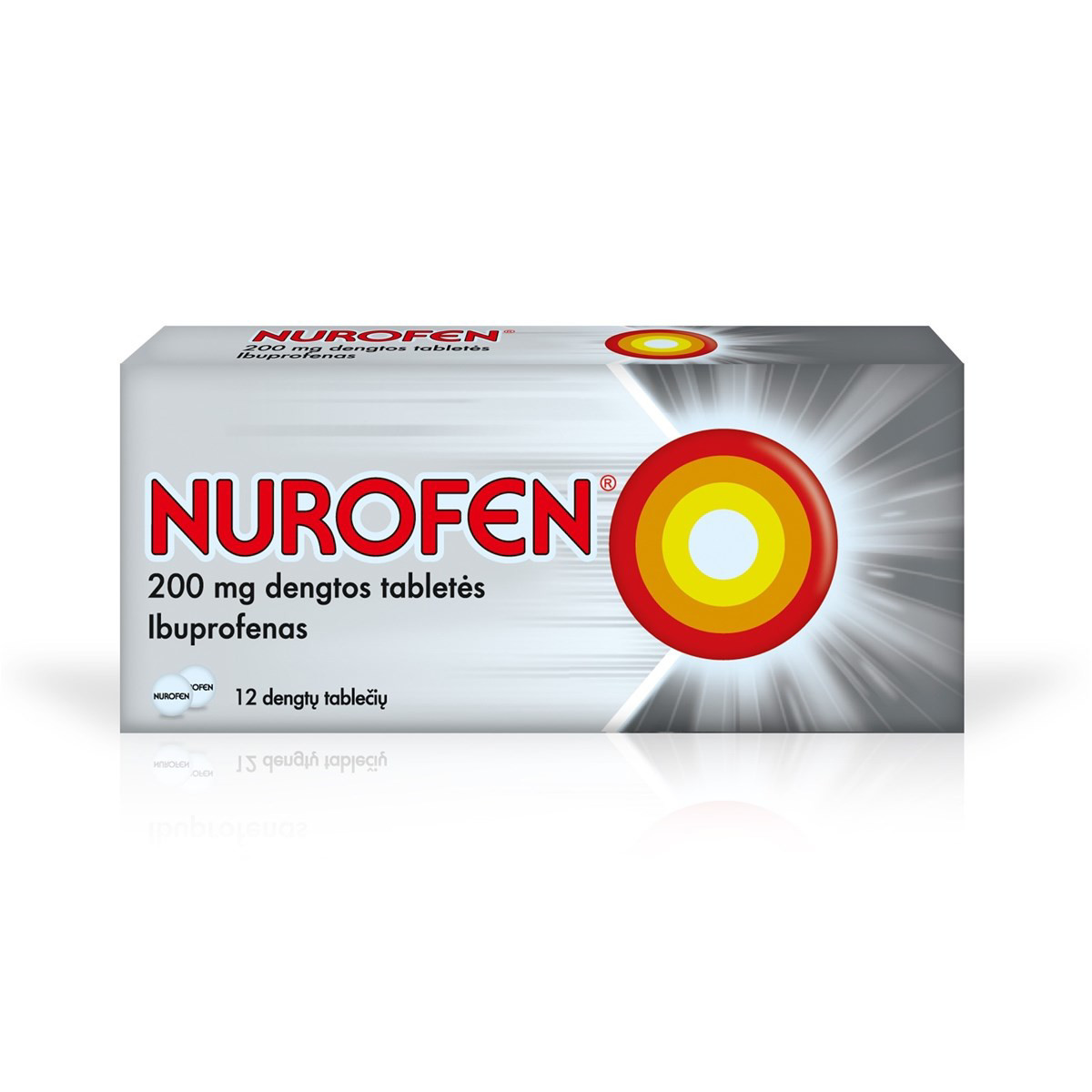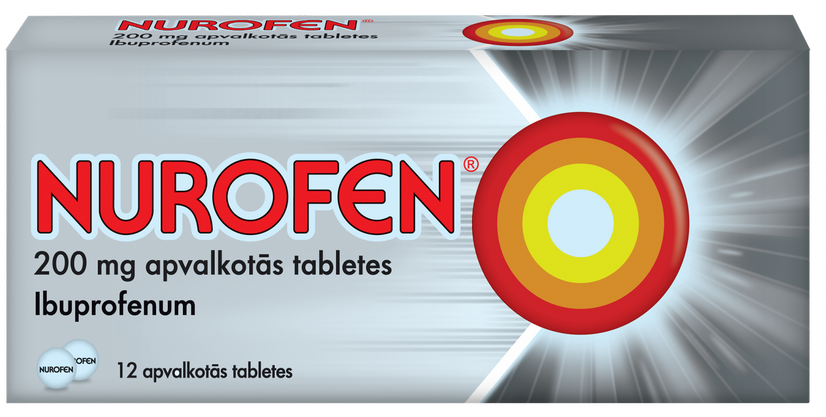Unreasonable use of drugs is harmful to your health! |
|
|
|||||||||||||||||||||||||||||
NUROFEN TBL 200MG N12
Attention: Information on this site is provided for informational purposes and is not meant to substitute for the advice provided by your own physician or other medical professional. You should not use the information contained herein for treating a health problem or disease, or prescribing any medication. iDrugs24.com is not responsible for any damage to your health as the result of self treatment.
# On 2024-Apr-161.72€ 1.83$ 1.47£ 199Rub 19.9SEK 7PLN 6.81₪

| Maximum allowed state defined price ( from ZVA webpage) Euro: | Recheck |
Reģ. Nr.: 01-0449
ATC code: M01AE01
Active substances: Ibuprofenum
Vendor, principal: Reckitt Benckiser Healthcare.
No prescription needed/Patient care products, dressings, gloves, medical devices,...

NUROFEN 200MG N12
Package leaflet: Information for the user
Nurofen, 200 mg film-coated tablets
IbuprofenRead all of this leaflet carefully before you start using this medicine because it contains important information for you.
- Always use this medicine exactly as described in this leaflet or as your doctor, pharmacist or nurse has told you.
- Keep this leaflet. You may need to read it again.
- Ask your pharmacist if you need more information or advice.
- If you get any side effects, talk to your doctor, pharmacist or nurse. This includes any possible side effects not listed in this leaflet. See section 4.
- You must talk to a doctor if you do not feel better or if you feel worse after 4 days.What is in this leaflet
- What Nurofen is and what it is used for
- What you need to know before you use Nurofen
- How to use Nurofen
- Possible side effects
- How to store Nurofen
- Contents of the pack and other information1. What Nurofen is and what it is used for
Nurofen is a medicine with analgesic, anti-inflammatory and antipyretic effect.Indications
Mild to moderate pain.
Dysmenorrhea (painful menstruation). Fever.2. What you need to know before you use Nurofen
Do not use Nurofen:
- if you are allergic to ibuprofen or any of the other ingredients of this medicine (listed in section 6);
- if you have previously had hypersensitivity reactions (e.g. asthma, angioedema, bronchospasm, rhinitis or hives), which have been associated with using acetylsalicylic acid or another nonsteroidal anti-inflammatory drug;
- if you have severe heart, kidney or liver failure;
- if you have a peptic gastric ulcer or gastrointestinal haemorrhage;
- if you have previously suffered from a gastrointestinal haemorrhage or perforation as a result of using non-steroidal anti-inflammatory substances;
- if you have had a severe or recurrent gastrointestinal ulcer/haemorrhage (two or more distinct ulceration or bleeding events);
- if you have malignant hypertension;
- if you have inflammation of the optic nerve;
- if you have expressed thrombocytopenia.
Nurofen is contraindicated in the last trimester of pregnancy.
Inform your doctor before taking this medicine if you suffer from any of the listed conditions or illnesses.Take special care with Nurofen:
- if you have kidney, heart or liver impairment;
- if you have or have had bronchial asthma or allergy, as you may develop bronchospasm;
- if you have a stomach or duodenal ulcer.
Take special care in the case of systemic connective tissue disease (lupus erythematosus and mixed collagenosis).
If visual disturbance occurs, stop the treatment.
The elderly are at a higher risk of severe side effects (especially gastrointestinal haemorrhage and perforation that may be lethal).
Children and adolescents
Dehydrated children and adolescents have a risk of renal impairment.
During the use of Nurofen, avoid taking other non-steroidal anti-inflammatory drugs (NSAIDs).
There is some evidence that anti-inflammatory and analgesic medicines (incl. ibuprofen) may cause decreased fertility in women. The disorder is reversible and recedes after the discontinuation of the medicine.
Anti-inflammatory/analgesic medicines, such as ibuprofen, may be associated with a slightly increased risk of infarction or stroke, especially when used in large doses. Do not exceed the recommended dose or duration of treatment.
Talk to your doctor or pharmacist before taking Nurofen:
- if you have heart problems, such as heart failure or angina (chest pain), or if you have had a heart attack, bypass, peripheral arterial disease (poor blood supply in legs or feet due to narrowed or clogged arteries) or any type of stroke (incl. mini-stroke or transient ischemic attack (TIA));
- if you have high blood pressure, diabetes or high cholesterol, if heart disease or stroke has occurred in your family history or if you smoke.
You are at a higher risk of gastrointestinal haemorrhage, ulceration and/or perforation (hole in the gut wall) if your dose of NSAIDs has been increased or if you have had a gastrointestinal ulcer in the past, especially if the ulcer was with a complicated bleeding or perforation, as well as if you are elderly. You should start treatment with the lowest dose, if possible.
Tell your doctor about any unusual gastrointestinal symptoms (such as gastrointestinal haemorrhage), especially if these occur at the beginning of treatment.
If gastrointestinal haemorrhage or ulcer occurs during treatment with ibuprofen, the treatment should be stopped immediately.
Patients with a history of gastrointestinal diseases (ulcerative colitis or Crohn’s disease) should take NSAIDs with special care and under a doctor’s supervision.
Take special care if you are concomitantly using medicines that increase the risk of a gastrointestinal ulcer and haemorrhage, such as oral corticosteroids, medicines that reduce blood clotting (anticoagulants, e.g. warfarin), selective serotonin reuptake inhibitors (certain antidepressants) or platelet aggregation inhibitors, such as acetylsalicylic acid.
In very rare cases, the use of NSAIDs has caused severe skin disorders, some of which are potentially lethal (incl. exfoliative dermatitis, Stevens-Johnson syndrome, toxic epidermal necrolysis). The risk of skin reactions is the highest at the beginning of treatment (especially in the first month of treatment). If you experience a skin rash, mucosal lesion or another symptom of hypersensitivity, stop using ibuprofen immediately and talk to your doctor.Other medicines and Nurofen
Tell your doctor if you are taking or have recently taken any other medicines, including medicines obtained without a prescription. It may be necessary to adjust the doses of used medicines or stop using a medicine.
Nurofen may influence the effect of other medicines and vice versa. These medicines include, for example:
- lithium (medicine used in psychiatry);
- dioxin (medicine used to treat heart failure);
- anticoagulants (medicines that thin the blood and prevent the formation of blood clots, e.g. aspirin or acetylsalicylic acid, warfarin, ticlopidine);
- medicines to treat high blood pressure (ACE inhibitors, such as captopril; beta-blockers, such as atenolol; angiotensin II receptor antagonists, such as losartan);
- methotrexate, cyclosporine (medicines used in cancer treatment and rheumatology);
- platelet aggregation inhibitors and selective serotonin reuptake inhibitors (SSRIs - certain antidepressants) increase the risk of gastrointestinal haemorrhage;
- medicines which increase urine production (diuretics);
- medicines which prevent the formation of blood clots or anticoagulants, such as warfarin:
NSAIDs may increase their effect;
- other NSAIDs, such as acetylsalicylic acid (aspirin) or diclofenac;
- some preparations used to treat infections (quinolone antibacterial preparations);
- corticosteroids increase the risk of gastrointestinal haemorrhage or ulceration;
- mifepristone (medicine used in gynaecology);
- concomitant use of alcohol may increase side effects of ibuprofen on the gastrointestinal tract;
- probenecid (gout medicine).
Some other medicines may influence the use of Nurofen or vice versa. Therefore, always tell your doctor or pharmacist before taking Nurofen with other medicines.Pregnancy, breast-feeding and fertility
Talk to your doctor or pharmacist before using the medicine.
The use of ibuprofen is not recommended during the first two trimesters of pregnancy. Contraindicated from the 20th week of pregnancy.
Ibuprofen is excreted in breast milk in very small quantities. Breast-feeding should be discontinued in the case of a need for prolonged treatment.
This medicine belongs to a group of medicines (NSAIDs) that may pose a risk to a woman’s fertility. The effect is reversible when you stop using the medicine.Driving and using machines:
Nurofen may cause dizziness or other central nervous system disorders (e.g. drowsiness, nervousness). If you get any of these symptoms, avoid driving and using machines.Nurofen contains sucrose and sodium
This medicine contains 116.1 mg (0.34 mmol) of sucrose per dose (1 tablet). Do not use this medicine in the case of hereditary fructose intolerance, glucose-galactose malabsorption or sucrase-isomaltase deficinecy.
The medicine contains 1.1 mmol (25.3 mg) of sodium per 2 doses (2 tablets). This must be taken into account if you are on a controlled sodium diet.3. How to use Nurofen
Always use Nurofen exactly as your doctor has told you. Check with your doctor or pharmacist if you are not sure.
These tablets are intended for oral and only short-term use.
In order to relieve symptoms, use the minimum effective dose for the shortest possible time.
Adults and children above the age of 12
Short-term pain and fever: 200-400 mg (1-2 tablets), then 1 or 2 tablets every 4 hours as required. Do not take more than 6 tablets (1,200 mg) a day.
Postoperative, post-traumatic or toothache, acute muscle pain, muscle strains and sprains: 400-600 mg three to four times a day, 800 mg three times a day in the case of acute treatment.
In the case of other connective tissue diseases, the anti-inflammatory analgesic daily dose is 6002,400 mg.
Treatment of dysmenorrhea (painful menstruation): 400-600 mg (may be repeated in 6-8-hour intervals).
Migraine: prophylactic dose is 400 mg three times a day and 400-800 mg a day when the first symptoms occur.
Children: 20...40 mg/kg a day divided into 3-4 doses. For children, whose weight is 20 kg or more, a dose of 200 mg is administered 3 times a day; 200-400 mg 3 times a day for children weighing more than 30 kg; and 400 mg 3 times a day for children weighing more than 40 kg.
The tablet should be swallowed with plenty of water, preferably after a meal.
The maximum permitted daily dose for adults is 2,400 mg.
If your doctor has recommended a different dosage, follow your doctor’s instructions. If symptoms persist, talk to your doctor!
In order to relieve side effects, use the minimum effective dose for the shortest possible time required to control the symptoms.
The elderly: severe side effects are more likely to occur in the elderly. Use the minimum effective dose for the shortest possible time.
Without a doctor’s prescription, Nurofen should not be taken for more than 6 days in the case of pain; more than 3 days in the case of fever of uncertain cause; and the recommended dose should not be exceeded.
Children and adolescents
If children or adolescents need to take this medicine for more than 3 days or if they feel worse, talk to a doctor.If you use more Nurofen than you should:
If you have taken more Nurofen than you should, or if children have accidentally taken this medicine, contact your doctor or nearest hospital immediately to get information on possible dangers and necessary treatment options.
Symptoms of overdose include nausea, abdominal pain, vomiting (may be blood-mixed), headache, ringing in the ears, confusion and flickering eye movements. Drowsiness, chest pain, palpitations, loss of consciousness, seizures (mainly in children), weakness and dizziness, blood in the urine, chills in the body and respiratory problems may occur at particularly high doses.If you forget to use Nurofen:
Do not take a double dose to make up for a forgotten dose.Possible side effects
4.Like all medicines, Nurofen can cause side effects, although not everybody gets them.
The following criteria are used to estimate the incidence of side effects:
Very common: may affect more than 1 user in 10 Common: may affect 1-10 users in 100 Uncommon: may affect 1-10 users in 1,000 Rare: may affect 1-10 users in 10,000 Very rare: may affect less than 1 user in 10,000 Unknown: cannot be estimated from available data
Immune system disorders:
Uncommon: hypersensitivity reactions with hives and itching.
Very rare: severe hypersensitivity reactions. The symptoms may include swelling of the face, tongue and throat, breathing problems, tachycardia or a drop in blood pressure. Exacerbation of asthma and bronchospasm.
Patients with autoimmune disorders (such as systemic lupus erythematosus, systemic connective tissue disease) treated with ibuprofen have developed single symptoms of aseptic meningitis, such as stiff neck, headache, nausea, vomiting, fever and disorientation.
Psychiatric disorders:
Unknown: depression, hallucinations, confusion.
Cardiac disorders:
Very rare: heart failure and swelling.
Gastrointestinal disorders:
Uncommon: stomach pain, indigestion and nausea.
Rare: diarrhoea, flatulence, constipation and vomiting.
Very rare: peptic ulcer, perforation, gastrointestinal haemorrhage, which may be lethal, especially in the elderly. Ulcerative stomatitis, gastritis and pancreatitis. Exacerbation of ulcerative colitis and Crohn’s disease.
Nervous system disorders:
Uncommon: headache.
Very rare: aseptic meningitis.
Unknown: dizziness, parasthesia, drowsiness.
Renal disorders:
Very rare: acute renal impairment, papillary necrosis, especially in the case of long-term use. Unknown: various forms of nephrotoxicity, including intestitial nephritis and nephrotic syndrome.
Hepatic disorders:
Very rare: liver disorders.
Unknown: abnormal hepatic function, hepatitis, jaundice.
Blood and lymphatic system disorders:
Very rare: haematological disorders (anaemia, leukopenia, thrombocytopenia, neutropenia, pancytopenia, agranulocytosis, aplastic anaemia and haemolytic anaemia). Initial symptoms: fever, sore throat, superficial mouth ulcers, flu-like symptoms, severe fatigue, unexplained bleeding and bruises.
Skin and subcutaneous tissue disorders:
Uncommon: various skin rashes.
Very rare: severe skin reactions.
Unknown: photosensitivity.
A severe skin reaction called DRESS may occur. The symptoms of DRESS are skin rash, fever, swelling of the lymph nodes and an increase in the number of eosinophils (a type of white blood cells).
Eye disorders:
Unknown: optic neuritis and visual disturbances.
Ear and balance disorders:
Unknown: impaired hearing, tinnitus and vertigo.Reporting of side effects
If you get any side effects, talk to your doctor or pharmacist. This includes any possible side effects not listed in this leaflet. You can also report side effects directly via www.ravimiamet.ee. By reporting side effects you can help provide more information on the safety of this medicine.5. How to store Nurofen
Do not store at a temperature higher than 25 °C.
Keep this medicine out of the sight and reach of children.
Do not use this medicine after the expiry date which is stated on the carton. The expiry date refers to the last day of that month.
Do not throw away any medicines via wastewater or household waste. Ask your pharmacist how to throw away medicines you no longer use. These measures will help protect the environment.6. Contents of the pack and other information What Nurofen contains:
The active substance is ibuprofen. One tablet contains 200 mg of ibuprofen.
The other ingredients are croscarmellose sodium, sodium lauryl sulphate, sodium citrate, stearic acid, colloidal anhydrous silica, carmellose sodium, talc, dried acacia, sucrose, titanium dioxide, macrogol 6000, Opacode-S-1-277001 black (shellac, black iron oxide and propylene glycol).What Nurofen looks like and contents of the pack
Pack: 12 tablets in a blister (PVC/Al or PVC/PVdC/Al). Blisters are packaged in a cardboard carton.Marketing Authorisation Holder:
Reckitt Benckiser (Poland) S.A.
Ul. Okunin 1
05-100 Nowy Dwor Mazowiecki PolandManufacturers:
Reckitt Benckiser Healthcare International Ltd.
Nottingham site Thane Road Nottingham NG90 2DB United Kingdom
SIA Elvim
Kurzemes prospekts 3-513 RIGA, LV-1067 Latvia
For any information about this medicine, please contact the local representative of the Marketing Authorisation Holder.Local representative of the Marketing Authorisation Holder in Estonia:
Katrinko OÜ Kärberi 34-30 Tallinn 13919 Telephone: 5151555This leaflet was last revised in April 2018.
Instruction, annotation source for medicine: State Agency of Medicines, Estonia
• Medicaments images are for illustrative purposes only and may differ from the actual product.
|
| ||
| For pharmacies & healthstores For advertisers About |
|
|
